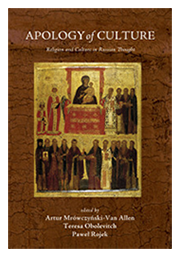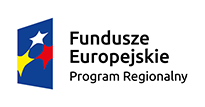 |
Artur Mrówczyński-Van Allen, Teresa Obolevitch, Paweł Rojek (eds)
Apology of Culture. Religion and Culture in Russian Thought
Eugene, OR: Pickwick Publications 2015, p. 252, ISBN 978–1–4982–0398–2
The book might be purchased at Wipf and Stock Publisher. By kind permission of the Publisher a part of the book might be downloaded here.
|
Apology of Culture is a timely volume addressing the unity of theology and culture in the conditions of extreme secularization of all forms of life. The appeal to the Russian religious philosophical thought provides a fresh look at the place of humanity in the world where diminution of communities and alienating tendencies of technology become threatening factors of its stability. The volume complements sources on ‘Radical Orthodoxy’ by advancing the scope of modern critique of secularism, atheism, and nihilism.
Prof. Alexei Nesteruk, University of Portsmouth, UK
Faced with the twin threat of moral relativism and secular nihilism, much of Christianity has become far too defensive and pietistic. To restore and renew Christendom, we need to re-enchant religious transcendence and recover the archaic western wisdom in a more culturally mediated and dispersed idiom. A more imaginatively ‘incultured’ faith can unite the patristic fusion of biblical revelation with Greco-Roman philosophy to the Romantic blending of high with popular and folk culture. These extraordinarily rich essays highlight the crucial contribution of Russian religious thought to such an orthodox yet generous Christian revival, in particular the integral unity of the person, the city and the cosmos; … mystical metaphysics combined with cosmic contemplation binds together nature with the supernatural and culture with faith.
Dr. Adrian Pabst, University of Kent, UK
Reviews
Contents
Introduction
- Apology of Culture and Culture of Apology: Russian Religious Thought against Secular Reason, Artur Mrówczyński-Van Allen, Teresa Obolevitch and Paweł Rojek.
Part I: Russian Thought and Secular Reason
- Man as Spirit and Culture: The Russian Anthropocentrism, Marcelo López Cambronero,
- The Trinity in History and Society: The Russian Idea, Polish Messianism, and the Post-Secular Reason, Paweł Rojek,
- Georgy Fedotov’s Carmen Saeculare: A Reflection on Culture as a Judgment of Modernity from the Philosophy and Theology of some Nineteenth and Twentieth Century Russian Thinkers, Artur Mrówczyński-Van Allen,
- The Polyphonic Conception of Culture as Counterculture in the Context of Modernity: Fr. Pavel Florensky, Mikhail Bakhtin, and Maria Yudina, Olga Tabatadze,
- Pavel Florensky on Christ as the Basis of Orthodox Culture and Christian Unity, Nikolai Pavluchenkov,
- The Problem of Christian Culture in the Philosophy of Vasily Zenkovsky, Oleg Ermishin,
- Overcoming the Gap between Religion and Culture: the Life and Works of Mother Maria (Skobtsova), Natalia Likvintseva,
- Apology of Culture in the Journals of Fr. Alexander Schmemann, Svetlana Panich.
Part II: Historical Focuses
- Catholicity as an Ideal Foundation of Social Life: Gregory Skovoroda and His Concept of the High Republic, Victor Chernyshov,
- Religiosity and Pseudo-Religiosity in Russia’s Nineteenth Century Liberation Movement Preceding Bolshevik Quasi-Religiosity, Katharina Anna Breckner,
- Tolstoy and Conrad’s Visions of Christianity, Brygida Pudełko,
- Nikolai Fedorov and Godmanhood, Cezar Jędrysko,
- Catastrophism as a Manifestation of the Crisis of Consciousness in Russian and Polish Cultures, Natalia Koltakova,
- Nikolai Berdyaev and the Transformations of the Idea of Humanism, Ovanes Akopyan,
- Between Idol and Icon. A Critical Appraisal of the Mystery Project of Culture by Vyacheslav Ivanov in the Context of the Thought of Jean-Luc Marion, Marta Lechowska,
- Ivan Il’in on the Foundations of Christian Culture, Yuri Lisitsa,
- Religious Realism and Historical Challenges: Vasily Zenkovsky and Russian Youth Abroad, Natalia Danilkina,
- Russian Religious Thought in the Middle of the Twentieth Century: Discursive Strategies in the Philosophical Diaries of Yakov Druskin and Alexander Schmemann, Maria Kostromitskaya,
- The Symphonic Unity of Traditions: Sergey Horujy’s Synergetic Anthropology and the Interpretation of History, Roman Turowski.
Part III: Religion, Politics, and Ecumenism
- The Roman Question in the History of Russian Culture in the Late-Nineteenth and Early-Twentieth Centuries, Fr. Yury Orekhanov,
- The Rotten West and the Holy Rus: Ethical Aspects of the anti-Occidentalism of the Contemporary Russian Orthodox Church, Fr. Marcin Składanowski,
- The Universalism of Catholicity (Sobornost’): Metaphysical and Existential Foundations for Interdenominational Dialogue in the Philosophy of Semen Frank, Gennadi Aliaiev,
- Local Civilisations and the Russian World: Nikolay Danilevsky and the Russian Orthodox Church of the Moscow Patriarchate, Olga Shimanskaya,
- The Idea of Antichrist in Russia: From Religious to Political Narration, Magda Dolińska-Rydzek.
Contributors
- Ovanes Akopyan, Doctoral Student at the University of Warwick, England.
- Gennadi Aliaiev, Professor at the Poltava National Technical Yuriy Kondratyuk University, Poltava, Ukraine.
- Katharina Anna Breckner, Independent scholar, Hamburg, Germany.
- Marcelo López Cambronero, Professor at the Institute of Philosophy “Edith Stein,” Granada, Spain.
- Victor Chernyshov, Professor at the Poltava National Technical Yuriy Kondratyuk University, Poltava, Ukraine.
- Natalia Danilkina, Assistant Lecturer at the Immanuel Kant Baltic Federal University, Kaliningrad, Russia.
- Magda Dolińska-Rydzek, Doctoral Student at the Justus-Liebig-Universität, Giessen, Germany.
- Oleg Ermishin, Research Fellow at the Alexander Solzhenitsyn Memorial House of the Russian Abroad, Moscow, Russia.
- Cezar Jędrysko, Doctoral Student at the Jagiellonian University, Krakow, Poland.
- Natalia Koltakova, Assistant Lecturer at the Interregional Academy of Personnel Management, Donetsk, Ukraine.
- Maria Kostromitskaya, Doctoral Student at the Russian State University for the Humanities, Moscow, Russia.
- Marta Lechowska, Assistant Lecturer at the Jagiellonian University, Krakow, Poland.
- Natalia Likvintseva, Research Fellow at the Alexander Solzhenitsyn Memorial House of the Russian Abroad, Moscow, Russia.
- Yuri Lisitsa, Professor at the St. Tikhon’s Orthodox University, Moscow, Russia.
- Artur Mrówczyński-Van Allen, Professor at the International Center for the Study of the Christian Orient and Instituto de Filosofía “Edith Stein,” Granada, Spain.
- Teresa Obolevitch, Professor at the Pontifical University of John Paul II in Krakow, Poland.
- Fr. Yury Orekhanov, Professor at the St. Tikhon’s Orthodox University, Moscow, Russia.
- Svetlana Panich, Research Fellow at the Alexander Solzhenitsyn Memorial House of the Russian Abroad, Moscow, Russia.
- Nikolai Pavluchenkov, Assistant Professor at St. Tikhon’s Orthodox University, Moscow, Russia.
- Brygida Pudełko, Assistant Professor at Opole University, Opole, Poland.
- Paweł Rojek, Assistant Lecturer at the Pontifical University of John Paul II in Krakow, Poland.
- Olga Shimanskaya, Associate Professor at the Linguistics University of Nizhny Novgorod, Russia.
- Fr. Marcin Składanowski, Assistant Professor at the John Paul II Catholic University of Lublin, Poland.
- Olga Tabatadze, Assistant Lecturer at the International Center for the Study of the Christian Orient, Granada, Spain.
- Roman Turowski, Doctoral Student at the Pontifical University of John Paul II in Krakow, Poland.




